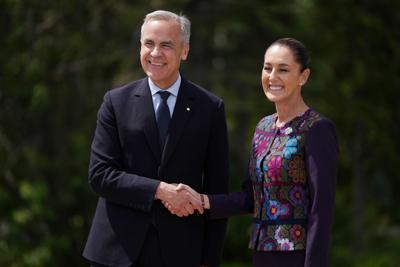As Prime Minister Mark Carney heads to Mexico this week, he must be experiencing a sense of déjà vu. As governor of the Bank of England, he saw what happened when the British people decided to decouple from their largest trading partner. History can’t repeat itself; Canada must avoid a Brexit-style breakup with the United States.
Ten years ago, the United Kingdom was divided into two camps, leavers and remainers. The leavers believed Britain had to break from the European Union to take back control of its economic sovereignty. The remainers warned the U.K. economy would suffer badly if Britons voted for Brexit in 2016.
Today, Canada is divided between those who believe we must remain actively committed to the renewal of the Canada-United States-Mexico trade agreement (USMCA, my preferred acronym for the agreement) and those who believe we should leave it to wither and die. The “remainers” warn that the Canadian economy will suffer badly if the USMCA isn’t renewed in 2026.
The facts are clear. The United States is Canada’s most important trade and investment partner by far. No combination of countries can replace our commercial relationship with the U.S. Yet even if there were such an alternative, shifting our trade away from the U.S. isn’t diversification — it’s diversion.
True diversification is addition, not subtraction. If we increase trade with other countries but reduce trade with the U.S., there would be no growth. Trade flows would simply net out — and that’s the best-case scenario. The value and volume of exports in specific sectors would almost certainly decline.
If Canada “crashes out” of the USMCA, to use a Brexit term, we’d be forced to disentangle ourselves from highly integrated supply chains built up over decades. We’d also have to find new export markets at a time when every other G20 country is seeking to diversify their trade and investment relationships.Â
Brexit is a cautionary tale; one Carney understands better than any other Canadian. As governor of the Bank of England, he dealt with its aftermath and had a front-row seat to the protracted negotiations between the UK and EU. He saw how private sector investment sat in wait on the sidelines.
This gives Canada an advantage. Carney knows how British Prime Minister David Cameron led the remain campaign and understands why it failed. The lessons he learned from Brexit can help Canada avoid a similar fate. Indeed, there’s early evidence that his government’s actions are guided by these insights.Â
Brexit wasn’t won or lost on economics but on emotions. Euroscepticism was stoked, in part, by the “leave” camp villainizing an unpopular president, in that case the European Commission’s Jean-Claude Juncker. Prime Minister Cameron never found a continental ally with whom he could close ranks.
Carney has Mexican President Claudia Sheinbaum. After a successful meeting on the margins of the G7 Summit, Carney will travel to Mexico City in the coming days to salvage a long-neglected relationship stickhandled poorly by his predecessor with an assist from provincial premiers.
While both leaders will want to avoid any appearance of ganging up on U.S. President Donald Trump, they can still come together in common cause. By strengthening the Mexico-Canada bilateral partnership, they implicitly strengthen the case for the renewal of the trilateral USMCA.
Canadian and Mexican business leaders will meet with both leaders in Mexico City to discuss opportunities in key sectors including energy, manufacturing, auto parts, financial services, tourism, transportation, as well as how to catalyze private sector investment to expand trade-enabling infrastructure.
In Sheinbaum, Carney has an asset Cameron never had: A popular foreign leader who can help sell the “remain” position at home while offering opportunities to diversify abroad. She can show Canadians the merits of the USMCA with a positive vision for the future of North American free trade.
The timing of Carney’s Mexico visit could not be better. In the coming days, the U.S. Trade Representative will formally launch its process to review the USMCA. That exercise and any corresponding consultations undertaken by our government will intensify the “leave” versus “remain” debate here in Canada.
In the months following the Brexit vote, opinion polls found Canadians were more likely to view Britain’s decision to leave the European as a mistake by a margin of more than two-to-one. As we approach our own “Brexit” moment, Canadians cannot make the same mistake. We must remain in the USMCA.
Error! Sorry, there was an error processing your request.
There was a problem with the recaptcha. Please try again.
You may unsubscribe at any time. By signing up, you agree to our and . This site is protected by reCAPTCHA and the Google and apply.
Want more of the latest from us? Sign up for more at our newsletter page.



























To join the conversation set a first and last name in your user profile.
Sign in or register for free to join the Conversation